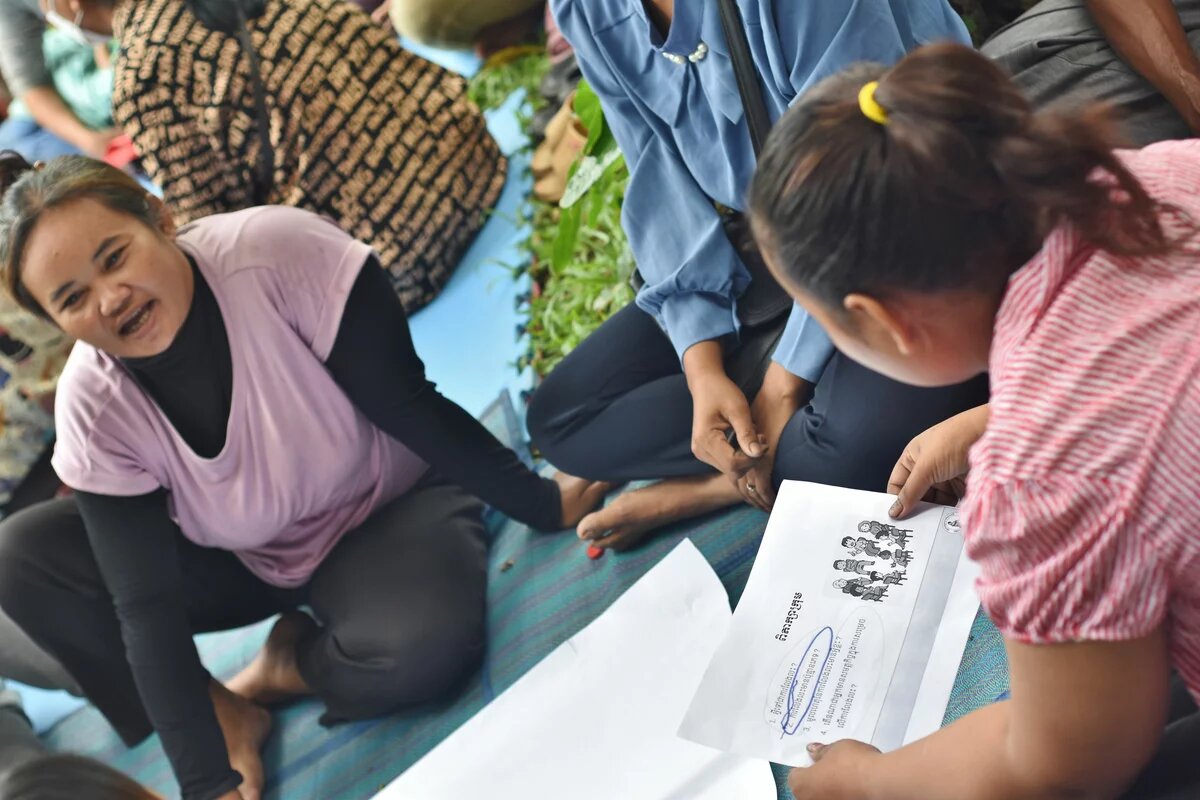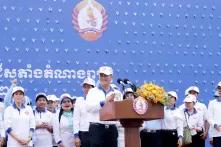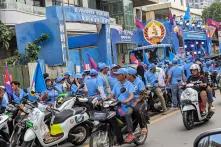The results of the July 2023 elections show that Cambodia is far from achieving its stated vision of gender equality and equitable political participation for women. A reflection.

After more than two decades of civil conflict, the warring factions reached an agreement in 1991 to end the fighting and establish a constitutional monarchy in the country with a democratically elected government.
In 1993, under the supervision of the United Nations, Cambodia held its first democratic election with four parties winning seats in the National Assembly. However, of the 120 seats in the National Assembly, only five were filled by women — starting a trend where women remain underrepresented in the political arena.
After reaching a high of 26 women members of parliament out of 123 total seats in the 2008 National Assembly election, the number of women has steadily declined in the last fifteen years. The downward trend was exacerbated following the dissolution of the Cambodia National Rescue Party in 2017 — only 19 and 16 women members were sworn in after the 2018 and 2023 elections.
The results show that Cambodia is far from achieving gender equality in terms of elected political representatives. The country remains a long way from achieving its stated vision of gender equality and women’s political empowerment, while little has been done to bring down barriers for women to enter politics and national political leadership.
Using conversation with women from diverse backgrounds, this article intends to reflect their views on the state of women’s representation in politics and ways to ensure women — who make up half the population and electorate — are well represented in positions of political power.
Ros Sopheap was one of the few female leaders of an NGO in Cambodia and has closely followed gender norms and women’s rights in the country. For Sopheap, Cambodian women looking to enter politics or leadership roles have equipped themselves with the requisite skills and resources over the last 30 years. The primary obstacle to their progress as national leaders has been patriarchal political leadership.
"And the decision-making in the party is concentrated only on one person, and that person has great power, so it makes the power concentrated; it makes [politics] inaccessible to other people that are willing to serve the nation,"says Sopheap.
She adds that another reason for women being held back is Cambodia’s electoral system, where the electorate votes for their preferred party as opposed to other parliamentary democracies where voters pick a candidate on the ballot. This makes it hard for women candidates to stand out in an already male-dominated political class.
Sonket Sereyleak, a coordinator for the education and gender program at Committee for Free and Fair Elections in Cambodia (COMFREL), says civil society groups working with women have always encouraged women to participate in politics through training sessions and workshops. They have also urged the government to put in place a fixed number of seats or political positions reserved for women at the national level.
Even though there has been an increase in women’s participation over successive elections, it will be hard to have more women on the ballot without stronger engagement and support from the male political leadership, Sereyleak says.
“The equal participation of women and men relies on political will as well as the high commitment of the leadership,” she says. “If we only have some tools like quotas or policies, but if the leader does not push for effective implementation, it will not be successful.”
According to Sereyleak, the presence of women in politics, especially in national leadership roles, is crucial to formulating policies and legal principles, ensuring gender equality in society, and addressing issues facing women, especially about discrimination and violence.
A joint report between COMFREL, SILAKA, Gender and Development for Cambodia, Banteay Srei, and the Committee to Promote Women in Politics, released in August 2023, states that progress on gender equality and inclusion of gender issues in national strategic plans had been held back due to the lack of women's representation in politics and senior leadership.
The report added that the low participation of women in politics also impeded important discussions about gender equality and environmental issues at the national level, especially when law-makers are formulating and approving laws and political decisions.
The report also found that women politicians continue to face discrimination and violence in the political sphere even though there are protections enshrined in the Cambodian Constitution and the Convention for the Elimination of All Forms of Discrimination Against Women, which Cambodia ratified in 1992.
Lork Kheng has been a Cambodian People’s Party (CPP) national assembly member since 2008. According to Kheng, women parliamentarians face a variety of social, family, educational, and financial challenges to participation in politics, including that they do not have time to take on leadership roles because it is assumed they will have to do domestic work.
“Family factors, like the support of parents, husbands, and children, are a big factor. The second is the refinement of our knowledge, our will, our courage, our intelligence, and our flexibility. We have tenderness, but we are still fearful,” she says.
Kheng did not feel there were legislative barriers to women joining politics and said the govern-ment had policies to encourage them, pointing to the “Neary Rattanak” policy from the Ministry of Women’s Affairs, which plans to foster gender mainstreaming in all branches of the government.
She felt that women had to be self-confident and that the barriers to entry can be higher for women as compared to their male counterparts.
“We have to be highly educated, work hard to strengthen our will and our courage, find out all the issues, and if we want to be members of parliament,” Kheng says.
Hiek Vecheka, an interim women's leader of the Grassroots Democratic Party (GDP), said Cambodian culture expects women to be in the background and be second to male figures in their lives. This perception deters them from entering politics, she adds.
“In Khmer culture and tradition, women have to stay behind; women have to obey and serve their husbands. So women's participation in politics is restricted by the community and the family,” she says. “Some women have to give up or not dare to participate in politics because they are under pressure to resign from politics.”
Vecheka said it was the GDP’s policy that if the first- or second-ranked candidate on the party’s nomination list was not a woman, then the third-ranked position had to automatically be filled by a woman. However, there were male members of her own party who were against this policy.
“Advocating for women is very difficult when most of the team is made up of men and women have lower [educational] degrees than men,” she says.
As a female politician from an opposition party, she would like to see greater representation of women in national politics so that women have more rights and opportunities to address issues facing the country.
The Ministry of Women’s Affairs has stated in the “Neary Rattanak” that it would take steps to expand women’s representation in senior government positions and the wider bureaucracy. The new government sworn in under Prime Minister Hun Manet has 15 percent senior female bureaucrats, according to the CPP’s Kheng, and 3 women in the 30 minister-strong Council of Ministers.
Ly Sreysros, a political commentator and research consultant, says there was a failure to implement measures and laws to encourage female participation in leadership roles, especially when there are more women and registered female voters in the country.
“So representation is very important at a time when the number of women is high, but the number of defenders of women's interests is low at the leadership level,” she says.
Sreyleak, from COMFREL, says the sustainable development goals also include achieving gender equality and highlighting the low participation of women in legislatures across the world. She adds that the Cambodian government should increase female bureaucrats to at least 35 percent of all civil servants, and increase support for women who want to move into senior leadership positions.
The National Assembly and the Senate must ensure that election related laws are gender sensitive, Sreyleak says, and that all political parties include more women candidates on their party nominee lists.
Sreyleak says the repressive actions against the political opposition and the lack of initiative from the ruling party — which holds 120 of 125 seats in the National Assembly — to increase women’s participation in politics had hurt women more than others.
“Women who want to join a political party are reluctant to participate, especially young women, even though they want to join politics. They started to withdraw because the political environment was not conducive to other political parties,” she says.
Edited by Ananth Baliga. This text was published first here.
The views expressed in this article reflect those of the authors and the interviewed people and do not necessarily reflect the views of the Heinrich Böll Stiftung Cambodia.


